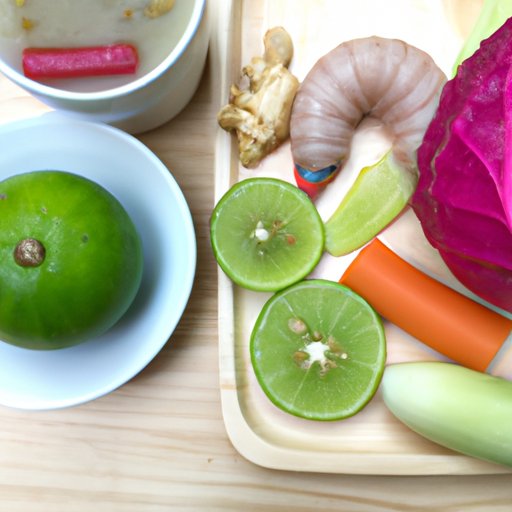Introduction – What Are Stomach Ulcers and How Are They Treated?
A stomach ulcer is an open sore in the lining of the stomach or small intestine. It is caused by an imbalance between digestive juices and protective mucus, leading to erosion and inflammation of the stomach lining. This can lead to intense pain, nausea, vomiting, and other uncomfortable symptoms. The good news is that there are many ways to treat and manage stomach ulcers, including dietary changes and lifestyle modifications.
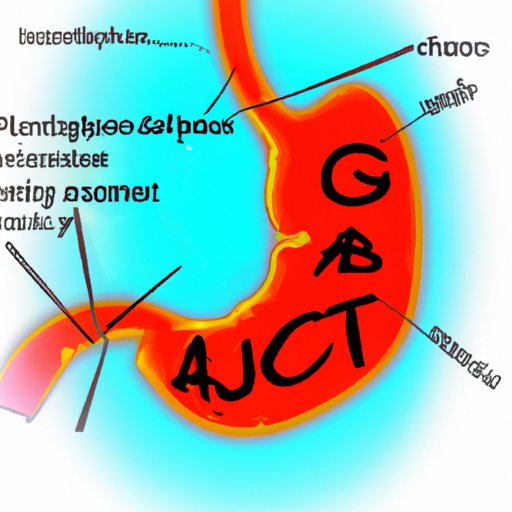
A. Definition of Stomach Ulcers
Stomach ulcers, also known as peptic ulcers, are sores that form on the lining of the stomach or small intestine. They are usually caused by an imbalance between the digestive juices produced by the stomach and the protective mucus produced by the lining of the stomach or small intestine. This imbalance leads to erosion and inflammation of the lining, which can cause intense pain and discomfort.
B. Causes of Stomach Ulcers
The most common cause of stomach ulcers is a bacterial infection called Helicobacter pylori (H. pylori), which is present in approximately two-thirds of people with stomach ulcers. Other possible causes of stomach ulcers include certain medications, such as nonsteroidal anti-inflammatory drugs (NSAIDs) and steroids, as well as stress, smoking, and alcohol use.
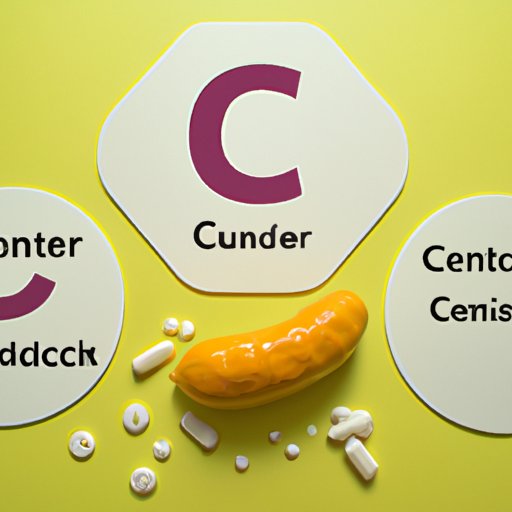
C. Treatment Options for Stomach Ulcers
In addition to antibiotics to treat the infection if needed, treatment for stomach ulcers typically involves lifestyle modifications, such as quitting smoking, limiting alcohol intake, and reducing stress. Dietary changes are also often recommended, as certain foods can help reduce symptoms and promote healing. In some cases, surgery may be necessary to remove the ulcer.
Eating For Ulcer Relief: Nutrient-Rich Foods to Help Soothe Stomach Ulcers
Making dietary changes can be a powerful tool in managing and treating stomach ulcers. Eating a balanced diet full of fresh fruits and vegetables, whole grains, lean proteins, and healthy fats can help provide nutrients to support healing and reduce symptoms. Certain foods can also help reduce inflammation and provide relief from pain associated with stomach ulcers.
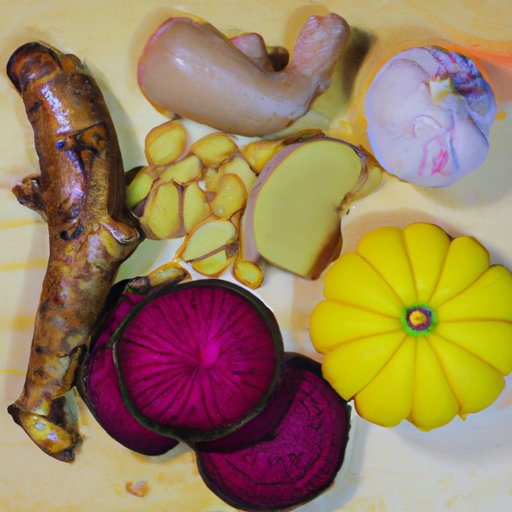
A. Foods That Provide Nutrients to Help Heal Stomach Ulcers
Eating a balanced diet filled with nutrient-rich foods can help provide the body with the energy and nutrients it needs to heal. Some foods that can help provide these nutrients include:
- Fruits and vegetables: Fruits and vegetables are rich in vitamins, minerals, and antioxidants, which can help reduce inflammation and boost immunity.
- Whole grains: Whole grains are a great source of fiber and B vitamins, which can help reduce inflammation and improve digestion.
- Lean proteins: Lean proteins, such as fish, poultry, eggs, and legumes, are packed with essential amino acids that can help repair and rebuild tissue.
- Healthy fats: Healthy fats, such as olive oil, avocados, and nuts, are important for providing energy and essential fatty acids.
B. A Diet Guide for People with Stomach Ulcers: What to Eat and Avoid
In addition to eating a balanced diet full of nutrient-rich foods, there are certain foods that should be avoided when dealing with a stomach ulcer. These include:
- Spicy foods: Spicy foods can irritate the stomach lining and worsen symptoms.
- Alcohol: Alcohol consumption can increase stomach acid production and irritate the stomach lining.
- Caffeine: Caffeinated beverages can increase stomach acid production and irritate the stomach lining.
- Processed foods: Processed foods are typically high in sodium, sugar, and unhealthy fats, which can worsen symptoms.
The Best Foods for Stomach Ulcers: Helping to Reduce Symptoms
Certain foods can help reduce symptoms of stomach ulcers, such as pain, nausea, and vomiting. These include:
- Yogurt: Yogurt contains probiotics, which are beneficial bacteria that can help reduce inflammation and improve digestion.
- Oatmeal: Oatmeal is a high-fiber food that can help absorb excess stomach acid and reduce irritation.
- Bananas: Bananas are a good source of potassium, which can help reduce inflammation and pain.
- Broccoli: Broccoli is high in fiber, vitamin C, and antioxidants, all of which can help reduce inflammation.
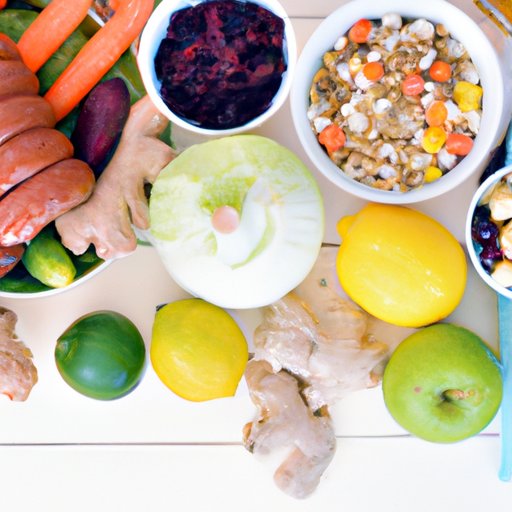
Combatting Stomach Ulcers with Healthy Eating: Tips for Eating Well
When dealing with a stomach ulcer, it’s important to make sure you’re eating a balanced, nutrient-rich diet that includes plenty of fruits and vegetables, whole grains, lean proteins, and healthy fats. Here are some tips for eating well:
- Eat small, frequent meals throughout the day.
- Drink plenty of fluids, such as water and herbal teas.
- Avoid eating late at night.
- Limit your intake of spicy, acidic, and processed foods.
- Avoid alcohol and caffeine.
Healing Your Stomach Ulcer: How Certain Foods Can Help You Feel Better
In addition to making dietary changes, there are several foods that can help heal a stomach ulcer. These include:
- Garlic: Garlic is a natural antibiotic and can help fight off H. pylori infections.
- Ginger: Ginger has anti-inflammatory properties and can help reduce nausea and pain.
- Turmeric: Turmeric is a powerful antioxidant that can help reduce inflammation.
- Aloe vera: Aloe vera is a natural healing agent that can help soothe the stomach lining.
Conclusion – Summary of the Benefits of Eating for Stomach Ulcer Relief
Eating a balanced diet full of nutrient-rich foods is one of the best ways to manage and treat stomach ulcers. Certain foods, such as fruits and vegetables, whole grains, lean proteins, and healthy fats, can provide the body with the energy and nutrients it needs to heal. Additionally, avoiding certain foods, such as spicy, acidic, and processed foods, can help reduce symptoms and promote healing. Finally, incorporating certain healing foods, such as garlic, ginger, turmeric, and aloe vera, can help reduce inflammation and protect the stomach lining.
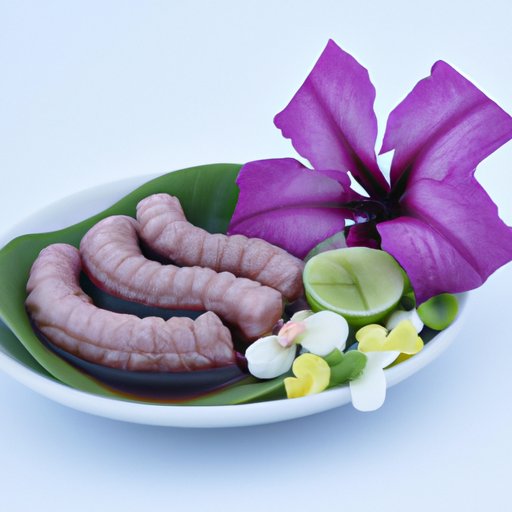
of the Benefits of Eating for Stomach Ulcer Relief
Eating a balanced diet full of nutrient-rich foods is one of the best ways to manage and treat stomach ulcers. Certain foods, such as fruits and vegetables, whole grains, lean proteins, and healthy fats, can provide the body with the energy and nutrients it needs to heal. Additionally, avoiding certain foods, such as spicy, acidic, and processed foods, can help reduce symptoms and promote healing. Finally, incorporating certain healing foods, such as garlic, ginger, turmeric, and aloe vera, can help reduce inflammation and protect the stomach lining.
B. Final Words of Advice for People With Stomach Ulcers
If you have a stomach ulcer, it is important to make sure you are eating a balanced diet full of nutrient-rich foods. Additionally, avoiding certain foods, such as spicy, acidic, and processed foods, can help reduce symptoms and promote healing. Finally, incorporating certain healing foods, such as garlic, ginger, turmeric, and aloe vera, can help reduce inflammation and protect the stomach lining. With the right dietary changes, you can help reduce symptoms and promote healing.
(Note: Is this article not meeting your expectations? Do you have knowledge or insights to share? Unlock new opportunities and expand your reach by joining our authors team. Click Registration to join us and share your expertise with our readers.)
